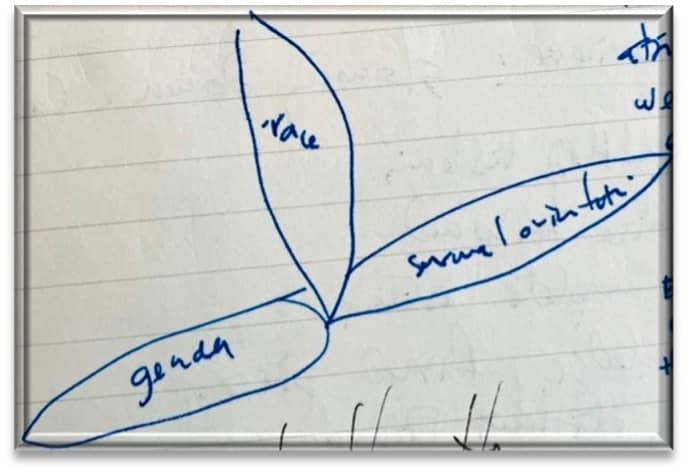
I have been following the good work of Mass Culture since its inception while I was running the Inter-Arts Office at Canada Council. I was excited to have a virtual arts research organization to complement existing arts structures with a mandate to ‘connect the dots’ and help us, all of us, understand who we are as an arts community and how to better work together with clear data and cooperative models.
I was impressed but not surprised, when I saw the breadth and calibre of Mass Culture’s Training Respectful, Adaptive and Inclusive Networks in the Arts (T.R.A.I.N.) program, some 49 online courses (plus nonsynchronous events):
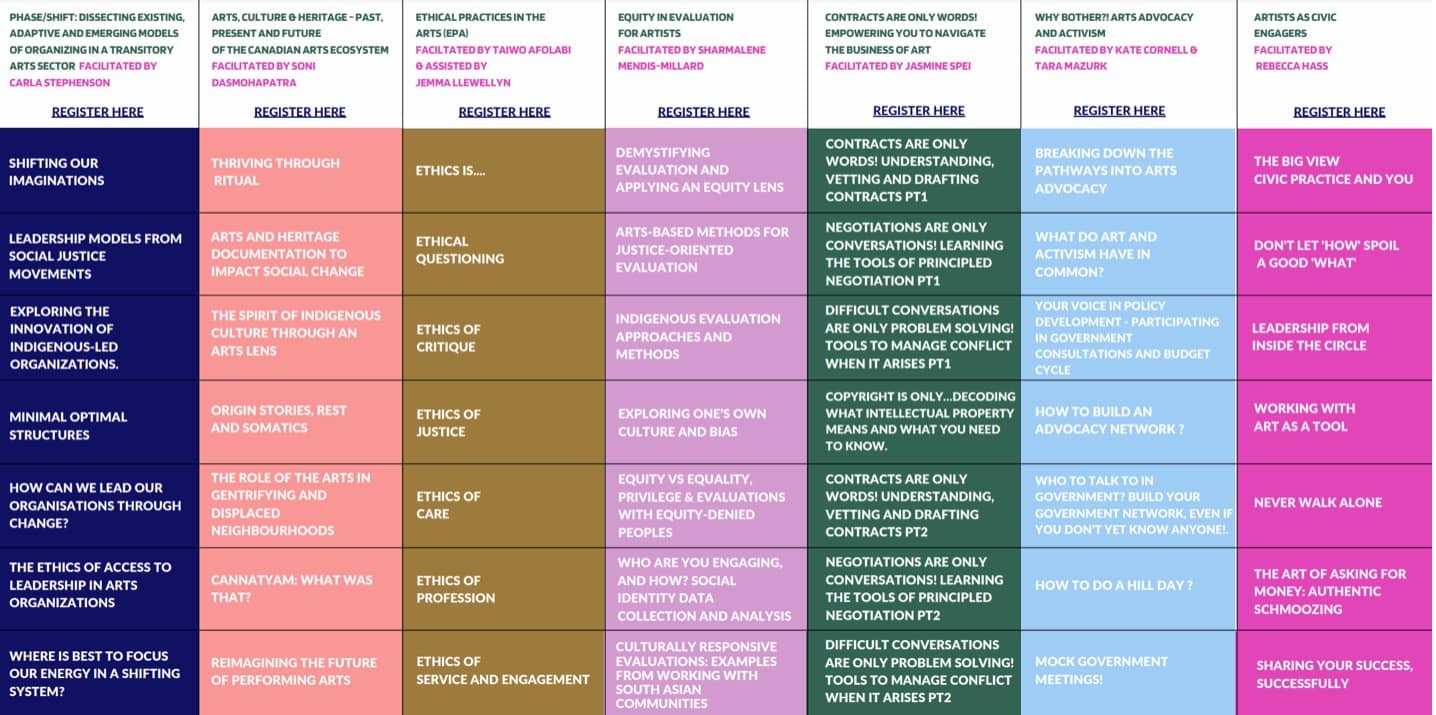
As a recently retired public servant (21 years at the Council), I wanted to take them all!
I was especially interested in learning (and unlearning) about modernity and decolonization in relation to my ‘Sounding Modernity’ project (season 4 of my conscient podcast) including an episode on privilege that I’m working on, therefore this workshop was a gift, and, well, a privilege…
February 15 session on ’equity versus equality, anti-oppression and reflecting on privilege’
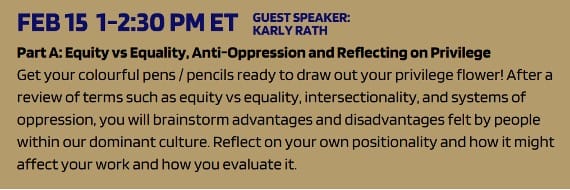
I ended up participating in sessions on navigating the Canadian arts ecosystem, ethical practices in the arts, emerging governance models and anti-oppression, civic engagement and arts advocacy and activism but it was the February 15, 2023 session on ‘equity versus equality, anti-oppression and reflecting on privilege’ as part of the equity in evaluation for artists module, facilitated by Sharmalene Mendis-Millard, that captured my attention and, in fact, took my breath away (which I why I was pleased Jagroop Mehta’s kind invitation to write about it).
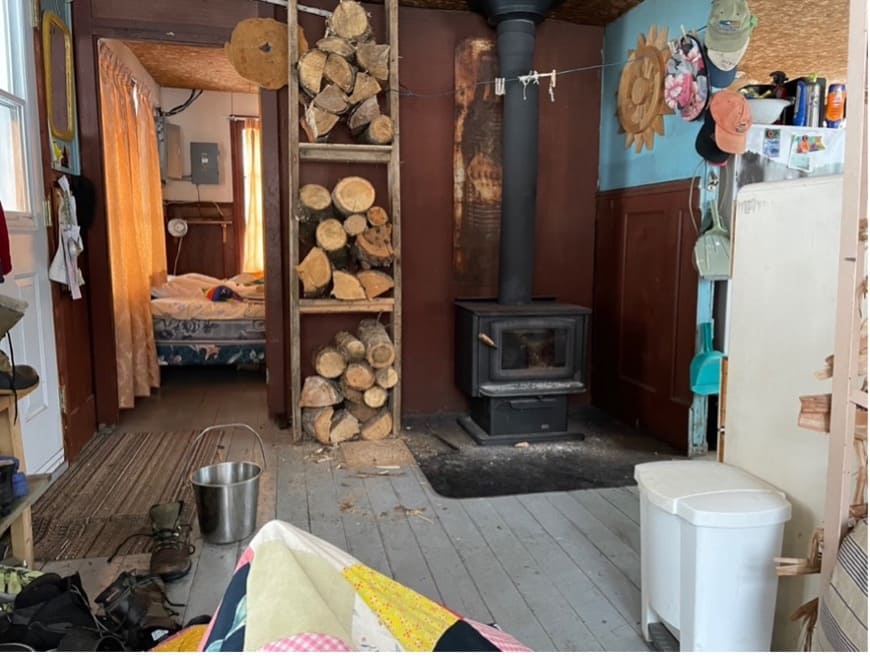
I was at the cottage that day (above is the view from my chair). It was cold and I was a bit nervous, because here I was in a privileged situation (albeit rustic) with the freedom to travel freely, access to nutritious food, the ability to express myself through art, easy access to nature, safety, comfort, etc.
Workshop leader Karly Rath began by asking us to think about ‘what does evaluating our work as artists or evaluating arts programming mean and how can we apply an equity lens to our evaluation?’.
Hum… This question was familiar to me from my equity training and policy work at the Canada Council in collaboration with several outstanding equity office leaders, including Sharon Fernandez, Melinda Mollineaux, Sheila James and Mana Rouholamini, however this time I was participating as arts community member without my institutional ‘armour’ however with the freedom to express myself freely on an issue that was central to work at the Council in Inter-Arts: equity of access for all peoples and arts practices. My concerns now have turned to equity of access for all living beings to a liveable planet however social and climate justice are inter-related issues.
Our group of about 20 arts leaders (of which, in passing, I was the only male) were asked to demystify the evaluation process, talk about the principles of equity and provide examples of how we might apply them in our daily practice as cultural workers.
We were also asked to reflect on our own privileges and positionality, and to think through how to use evaluation for social justice and change. This is a lot of ground to cover in 90 minutes, but the workshop was well thought through (as were the others) with a combination of practical information and creative participation.
Equity vs Equality cartoon
The workshop began with the now classic equity vs equality cartoon (see below), however this version also presented the dimension of ‘reality’ and ‘liberation’. Our group debated these issues and concluded equal participation and equal access were key to true equity (e.g., a level playing field for all) but that we were far from that…
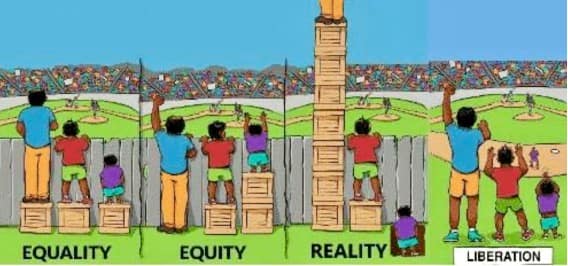
After covering other equity principles, we moved into a drawing exercise to help us reflect on our own privileges and positionality. In my drawing, below, I outlined a flower petal that approximates the amount of privilege I thought I had. In the context of this exercise, I drew large pedals under race, gender and sexual orientation. We then mapped out other forms of inequities, including ability, wealth, education, language, environment, geography, heterosexuality, body type, illness, neurodivergence and so on.
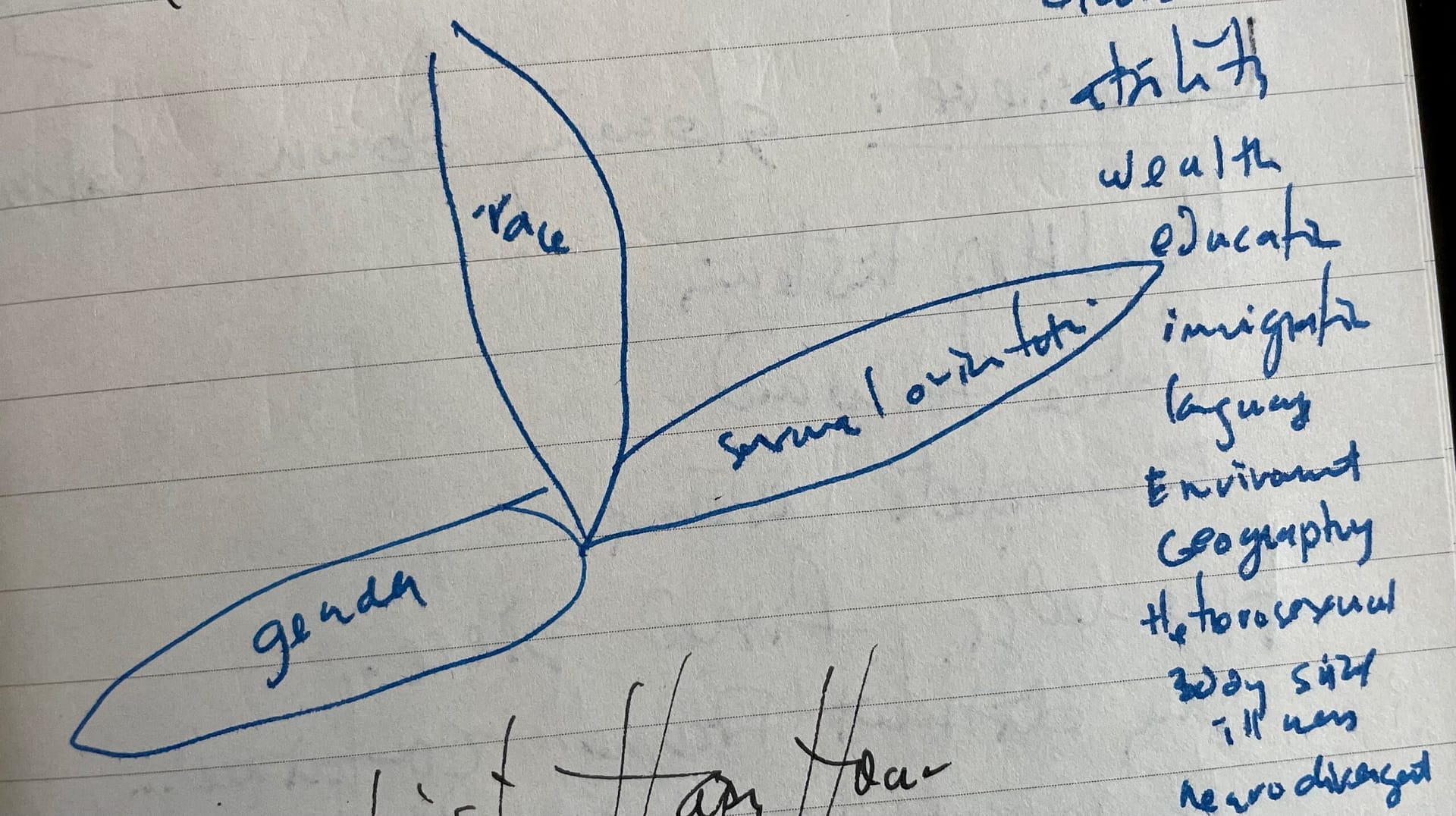
When asked to give examples from our lives, I mentioned that when I started at Canada Council in 1999 there was no direct support to deaf and disability artists but after years of community advocacy and artist consultations by staff, the Council now has in place a comprehensive set of policies to support deaf and disability arts, which shows that the system can change and the principle of ‘equity in evaluation for artists’ is possible, with time and effort and the ability of the bureaucracy to listen.
I also gave the example of ‘unconscious bias’ (defined as ‘social stereotypes about certain groups of people that individual form outside their own conscious awareness’) as an area where arts funders are currently building policy, but it is difficult to identify because those leading the policy work are often not sufficiently aware of their own unconscious bias. A vicious circle of good intentions…
Taking action
The workshop concluded with a set of ‘taking action’ points:
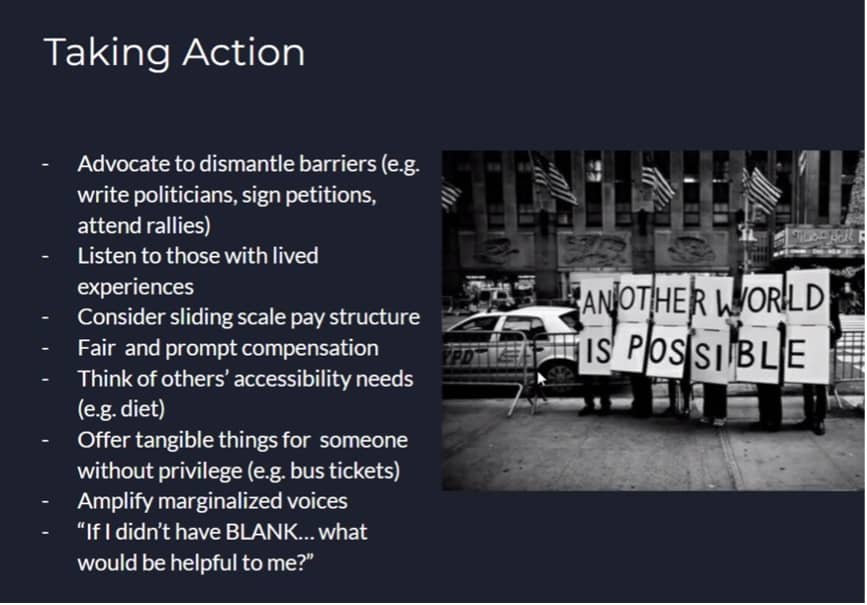
As someone interested in the ethics of listening, I thought ‘listening to those with lived experience’ was especially important to avoid falling into the pitfalls of arrogance and privilege.
I have an example in the chat about how the Ottawa Fringe’s Undercurrents Festival has a sliding scale ticket policy that I thought was more equitable and welcoming that standard pricing.
We were also encouraged to think about the last question: ‘If I didn’t have BLANK what would be helpful to me?’
My answer was the cottage where I attended this session. If I did not have this special space in nature, it would be helpful if someone shared theirs with me, which is something my wife Sabrina Mathews and I have done over the years and will continue doing.
The workshop ended after 90 minutes but was followed by part 2 (which I was not able to attend).
Thanks to workshop leaders and my fellow participants. I hope we can discuss these issues again soon and compare notes on our action plans.

Anjali Appadurai and environmental privilege
I would like to conclude a short excerpt from episode 23 of my conscient podcast (season 2). I had a ‘soundwalk’ conversation with climate activist and progressive politician Anjali Appadurai on April 2, 2021, in Vancouver (to subscribe see https://www.conscient.ca/subscribe/ ).
Near the end of this exchange where we spoke of various forms of privileges and Anjali, with her usual astuteness and insight, spoke of privilege in the context of the climate emergency (edited for concision):
When we talk about the extinction of our species, this extinction doesn’t happen overnight. It happens in a spectrum. Who are the last ones standing? Those with the most resources and who are the first ones to go? It’s those with the least, the most disenfranchised. So, I don’t think you can talk about climate without talking about privilege ultimately. And I think it’s on each of us to unpack that for ourselves and to bring that into the conversation. Because I see a lot of climate discourse that is happening on this level. … There’s a lot of framing about how to divide up in an equitable way, the remaining emissions, the sort of carbon budget of the world. So the carbon budget is a framing in and of itself and then there’s this other framing that floats around the right to atmospheric space and how, if you look at atmospheric space as a human right, and if you divide up how much we have left in the world, how many people have way more than what would be their fair share, how many people have way less? And that’s a deep question of privilege as well. And talking about the global north, I mean, that really plays into our global privilege.
